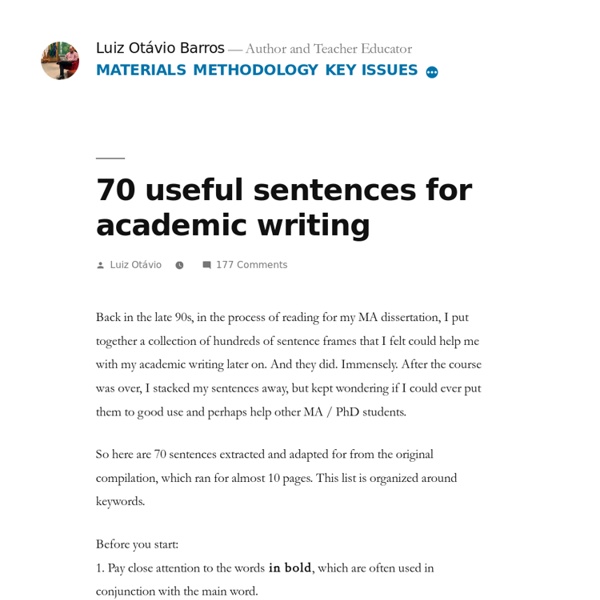Definition and Examples of Science Writing
Definitions (1) The term science writing refers to writing about scientific subject matter, often in a non-technical manner for an audience of non-scientists (a form of journalism or creative nonfiction). Also called popular science writing.
How to create content for private ESL lessons - Off2Class
Dear Teachers! The following is an excerpt from a guest post we did a couple months back for the mighty ELT Jam covering the building of content for private ESL lessons. The original article can be found here. Over the past seven years, we (founders of Off2Class) have been teaching private ESL lessons in several locations overseas (most recently in Istanbul).
Grammarphobia
Q: To “pressurize” is, to my mind, quite different from to “pressure.” The former means to inflate something and the latter to put pressure on someone. So why does our inflationary language permit “pressurize” to have both meanings?
Strategies for Academic Writing
How to Respond to Writing Assignments Step 1: Analyze the Assignment If the assignment was given orally, write it out and read it until you're thoroughly familiar with it.Look for key words. Pay particular attention to the thought process your instructor expects you to use, which is often captured in a single or set of key words.Look for what form your paper is expected to take; most will take one of these forms. Step 2: Consider the Writing Situation
Reading Scientific Text
There are many memory strategies that can be effective in improving your recall of text. However, recent research shows that it is simplistic to think that you can improve your remembering by applying any of these strategies to any text. Different strategies are effective with different types of text.
12 tiny tips for writing lesson plans
I recently took a CELTA extension course for teaching young learners. The course went well and I quite enjoyed writing formal lesson plans again. Tutors said that planning was my strength, which probably meant my teaching wasn’t that good! I’ve looked back at the positive comments from my tutors and shared some tips below for anyone who needs to write a formal lesson plan.
Writing an academic assignment
Even from first year, your role should be one of an objective critic. 1. Draw on logic and evidence, rather than emotion and uninformed opinion Objective writing involves making evaluations based on evidence, as well as existing points of view that are supported by evidence.
Home - Academic Writing and Citation Support - Research Guides at Thompson Rivers University Library
Hi there! Welcome to Writing and Citation Support for TRU students. This site was created for all TRU students; abroad, international and domestic.
Note-taking
To use note-taking effectively, you need to understand that its primary value is not in the record you produce, it is in the process itself. The process of taking notes guides the memory codes you make. Note-taking is a strategy for making information meaningful. It is therefore only effective to the extent that you paraphrase, organize and make sense of the information while taking notes. Note-taking is a strategy for making information meaningful.
Grammar Police: 30 of the Most Common Grammatical Errors We All Need to Stop Making
Even after years of education, there are some things that some people still mess up. For me, it's algebra. For others, it's the laws of physics.



